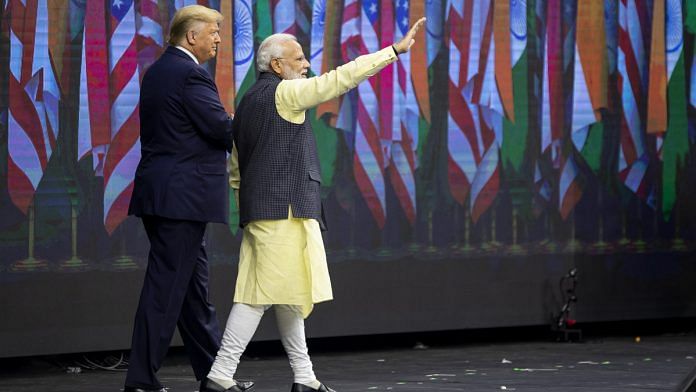Hong Kong/ New Delhi: If Prime Minister Narendra Modi was worried about a frosty reception in the U.S. after his crackdown on India’s Muslim-majority region of Kashmir, President Donald Trump was quick to put those fears to rest.
“Border security is vital to India,” Trump said alongside Modi, as the two spoke at a huge gathering of around 50,000 Indian-Americans on Sunday. “We understand that.”
The high-level acknowledgment from the world’s most powerful political leader comes as Modi — who will address the United Nations General Assembly on Friday — continues an unprecedented security crackdown in the tense Himalayan region of Jammu and Kashmir. On 5 August he abolished 70 years of regional autonomy and placed its citizens under widespread restrictions including an extended communications blackout.
Trump’s comments, although not explicit approval, are symbolic of the quiet acceptance of India’s policies which have attracted little international criticism. India’s actions have been compared to what China is doing in its own restive mostly-Muslim border region of Xinjiang. But few countries other than Pakistan and China, which both have territorial claims in disputed Kashmir, have criticized New Delhi — a stark contrast to the 22 states that signed a letter criticizing China’s crackdown against Muslim minority Uighurs, which has seen as many as 1 million citizens placed in “re-education camps.”
Nations want to keep Modi onside as they recognize India’s rising strategic importance in Asia as a counterweight to Beijing. There’s also the size of its market, including billions in arms purchases, and the fact that criticizing New Delhi risks aligning with Pakistan, which is widely accused of sponsoring terrorist groups in the region.
“There is little diplomatic upside to directly challenging India,” said Paul Staniland, an associate professor at the University of Chicago. “India is an important economic and strategic partner, or potential partner, for countries ranging from France to the U.S. to the Gulf states. It’s also clear that the government of India won’t be rolling back its policy anytime soon, and many countries are leery of seeming to back the Pakistani line.”
‘Grave Concern’
Pakistan Prime Minister Imran Khan, whose government denies supporting militants that strike inside India, told Trump on Monday there’s “a huge humanitarian crisis taking place” in the disputed region. He added the U.S. has a responsibility to get involved.
“This crisis is going to get much bigger, what is happening in Kashmir,” Khan said. “The United States — it’s the most powerful country, it can affect the United Nations Security Council, it has a voice, so we look to the U.S. to put out flames in the world.”
Modi’s Hindu nationalist Bharatiya Janata Party has long campaigned on removing Kashmir’s special status, and moved swiftly to enact its plans following a sweeping election victory in May.
But despite the prolonged detention of political leaders and the deployment of 10,000 extra Indian paramilitary forces, Kashmir’s turmoil has generated only muted global responses. A group of United Nations experts urged India to revoke its communications blackout, while Human Rights Watch has condemned the arbitrary detention of thousands.
“India’s sudden decision has brought our lives to a standstill,” said Javed Ahmed, a 30-year-old fruit seller in the Kashmiri capital of Srinagar, in an interview in late August. “It is about taking our resources and changing this land forever.”
The Prime Minister’s office didn’t respond to calls or an email.
A separate group of United Nations experts has expressed “grave concern” over a citizenship drive in Assam, where 1.9 million people are at risk of being stripped of their national identity over concerns they are Bangladeshis from across the border. Indian Home Minister Amit Shah has previously called illegal migrants “termites,” and the UN experts warned the registration process “may exacerbate the xenophobic climate while fueling religious intolerance and discrimination in the country.”
One reason Modi’s Kashmir move has not provoked more global outcry, said Kashish Parpiani, a fellow with New Delhi-based Observer Research Foundation, is the image India has successfully presented to the rest of the world.
“India’s status as a rising free-market, rancorous democracy known for soft power exports like yoga and Bollywood lend it a benign character,” Parpiani said. “Whereas China often acquires the ire of the international community owing to the common narrative surrounding its efforts to build an Orwellian authoritarian system.”
Important Ally
Modi wasn’t always beyond reproach. In 2005, he was denied a U.S. visa after deadly anti-Muslim riots rocked the state of Gujarat when he was chief minister in 2002, although he was officially cleared of blame. Some now want to prevent the Bill & Melinda Gates Foundation from giving Modi an award over abuses in Kashmir and Assam.
Modi has avoided the same type of international criticism China has received because what’s happening in Kashmir is nowhere near as bad as China’s abuses in Xinjiang, said Sameer Patil, a former assistant director at India’s National Security Council Secretariat and now International Security Studies Programme fellow at the Mumbai-based Gateway House.
“The other thing that’s important to understand is the strength of India’s market,” Patil said. Just as China has utilized its market size as leverage, India has also started to think this is something which ought to be used for foreign policy objectives.”
India has also skillfully handled the Trump administration, agreeing to significantly reduce Iranian oil imports, for example, while reacting forcefully after Trump offered to mediate the Kashmir dispute.
“The Modi government has managed Trump and his administration quite well, knowing when to flatter and when to push back,” said, Ian Hall, an international relations professor at Australia’s Griffith University. “Washington understands that India matters, because India complicates Beijing’s calculations, not just in South Asia, but across the Indo-Pacific.” – Bloomberg
Also read: Heard very aggressive statement from Modi on Pakistani terror, Trump says as Imran listens



